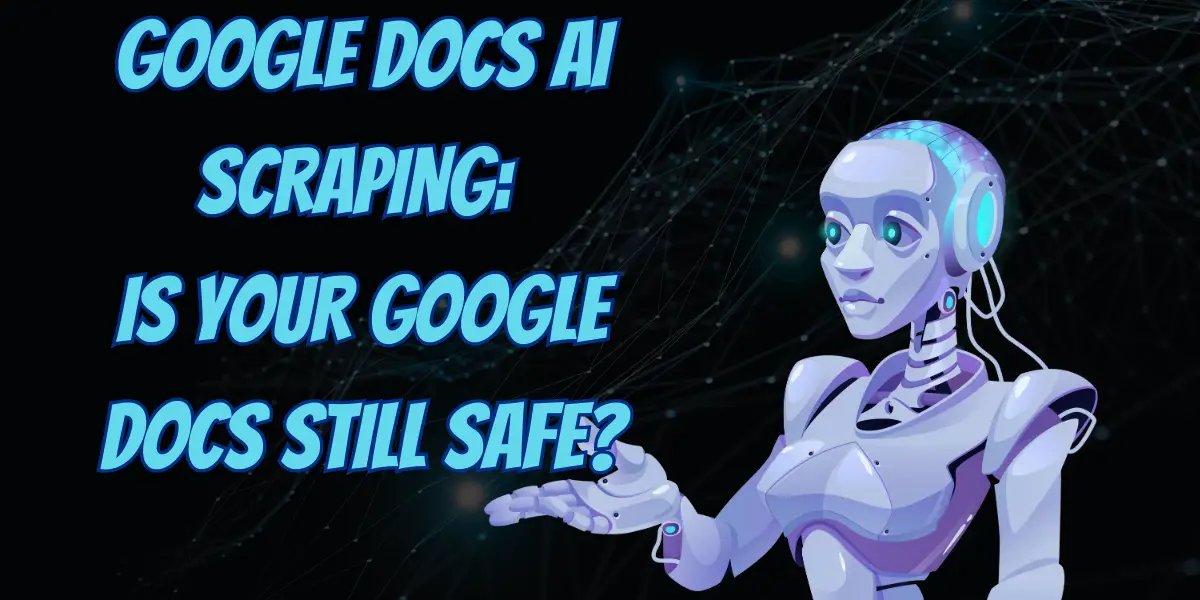Google Docs AI Scraping: Is Your Google Docs Still Safe?

In an era where data is the new oil, the question of privacy and security is more pertinent than ever. With the advent of AI and machine learning, tech giants like Google are leveraging vast amounts of data to improve their services. However, this has raised concerns about the safety and privacy of user data, particularly in relation to Google Docs. This article aims to shed light on these concerns and provide insights into the safety of using Google Docs.
Table of Contents
What is Google Docs?
Google Docs is a free, web-based word processing software offered by Google. It allows users to create, edit, and store documents online, enabling real-time collaboration. With Google Docs, multiple users can work on a single document simultaneously, making it a popular choice for businesses, educational institutions, and individuals alike.
Google Updates Its Privacy Policy
Recently, Google updated its privacy policy, revealing that its AI services, such as Bard and Cloud AI, may be trained on public data scraped from the web. This means that any publicly available information could potentially be used to train Google’s AI models. While this update has raised concerns, it’s important to note that Google has always been transparent about using publicly available information from the web to train its language models. The update merely clarifies that newer services like Bard are also included.
How does Google Docs Scrape Data?
Google’s AI services, including Google Docs, use a process called data scraping to improve their functionality. This involves analyzing the text in your Google Docs to understand language patterns, syntax, and other linguistic features. However, Google has stated that it does not use any customer content for any purpose except to provide the Document AI service, and it does not intend to use customer data to train its Document AI models in the future.
Google Keeps Track of All Services
Google’s ecosystem is vast and interconnected, encompassing services like search, email, cloud storage, and more. This interconnectedness means that data from one service can potentially inform others. For instance, data from your Gmail account might be used to enhance your Google Search experience. While this can lead to a more personalized and efficient user experience, it also means that your data is being shared across multiple platforms, potentially increasing the risk of exposure.
What should We Users Do?
As users, it’s important to stay informed about how our data is being used. Regularly review and update your privacy settings to ensure they align with your comfort level. Consider using encryption for sensitive documents, and be mindful of what you share online. Remember, once something is online, it can be difficult to completely erase. Also, consider using privacy-focused alternatives for sensitive tasks, and always be aware of the latest developments in data privacy laws and regulations.
Read More About:How to Solve chatgpt access denied and is chatgpt safe?
Some Internet Businesses Have Started Charging for Access to Their Data
In response to the growing concerns about data privacy, some internet businesses have started charging for access to their data. This model allows users to pay a fee in exchange for enhanced privacy protections. While this approach has its critics, who argue that privacy should not be a paid feature, it represents a potential shift in how online services handle user data, moving towards a more privacy-centric model.
Conclusion
In conclusion, while Google’s data scraping practices may raise privacy concerns, it’s important to remember that these practices are designed to improve services, not exploit users. However, it’s equally important for users to take proactive steps to protect their data. Stay informed, review your privacy settings regularly, and consider alternative services if you’re uncomfortable with how your data is being used. As the landscape of online privacy continues to evolve, so too must our approach to protecting our data. The key lies in striking a balance between leveraging the benefits of AI and maintaining our privacy. Despite the concerns, using Google’s products can still be safe, provided we take the necessary precautions and stay informed about our data’s usage.

